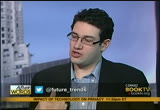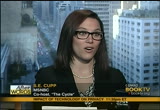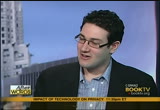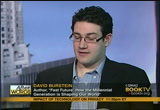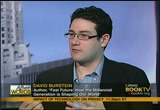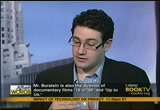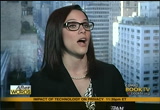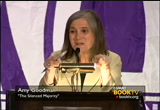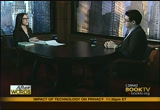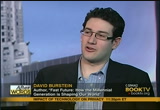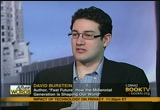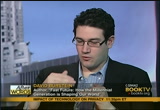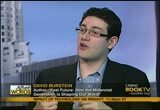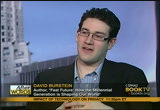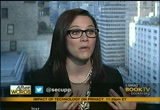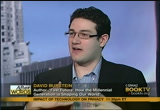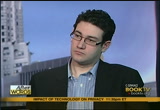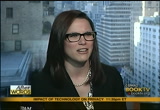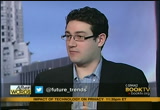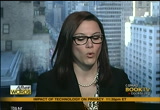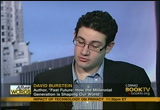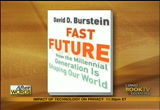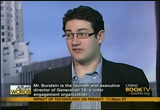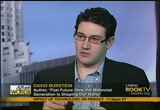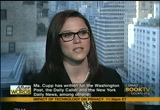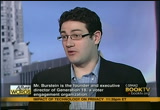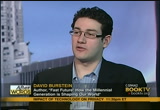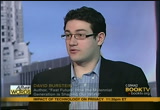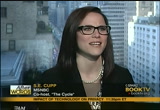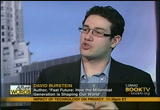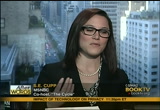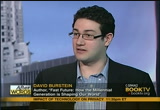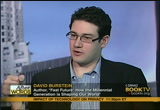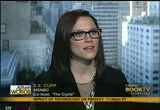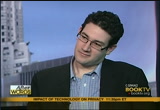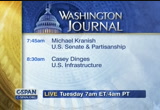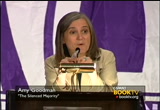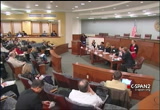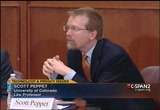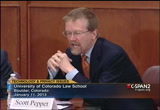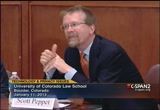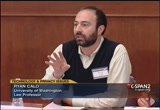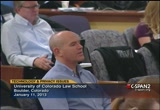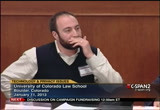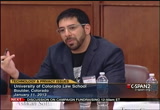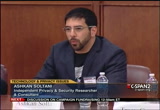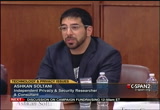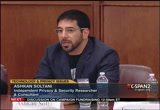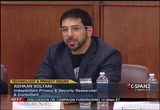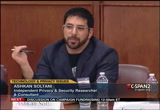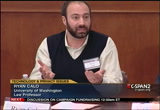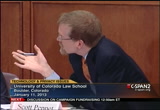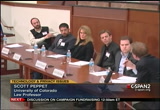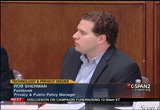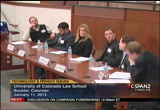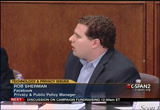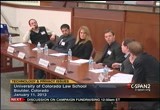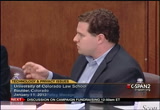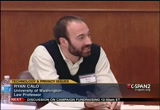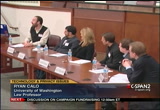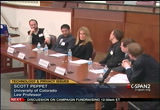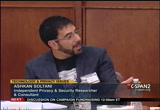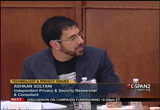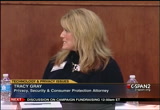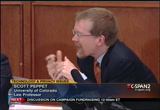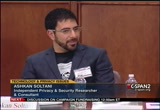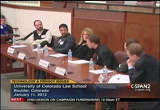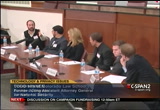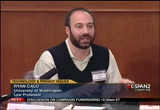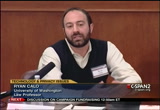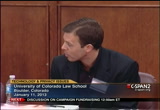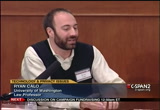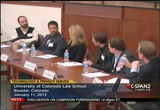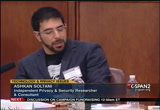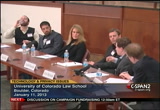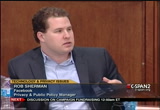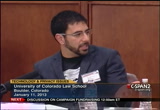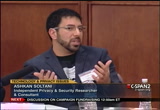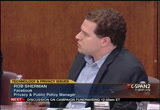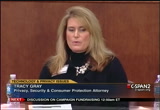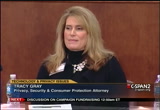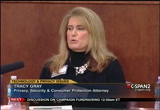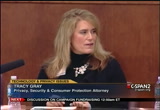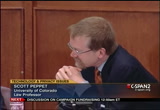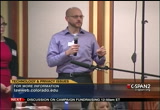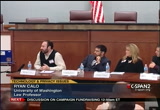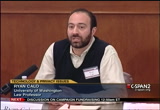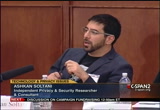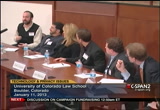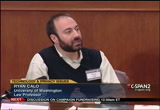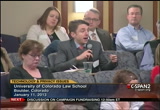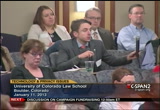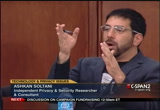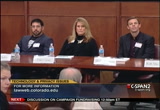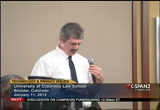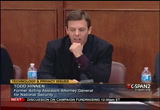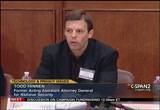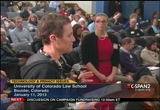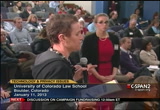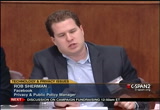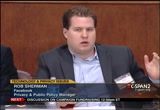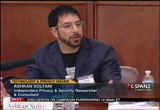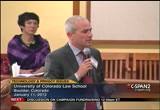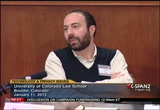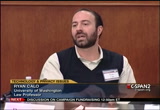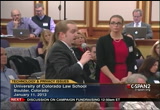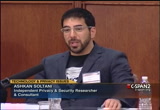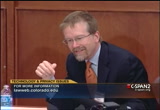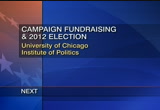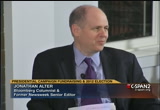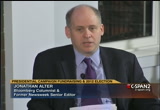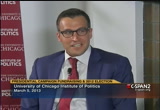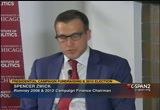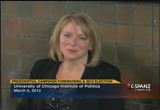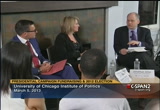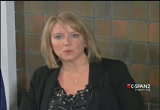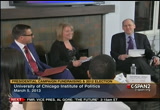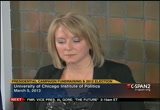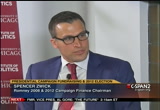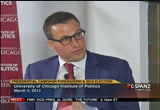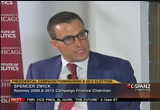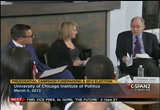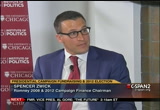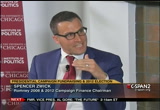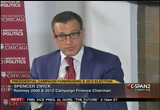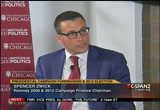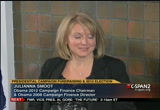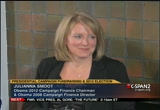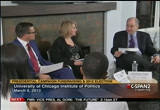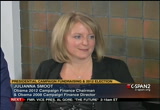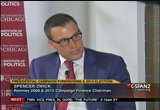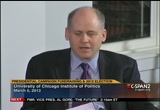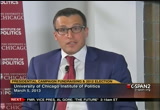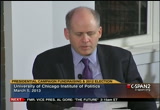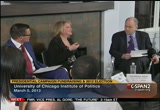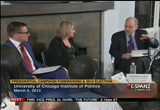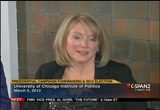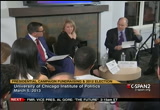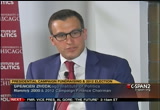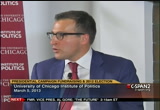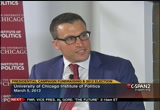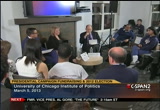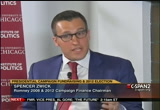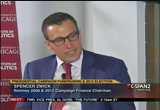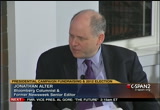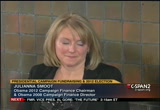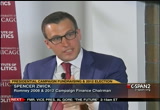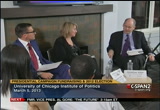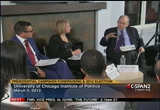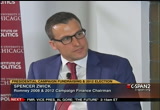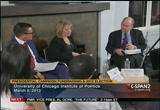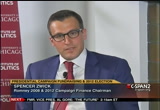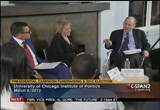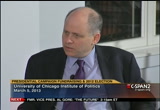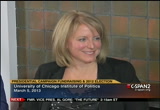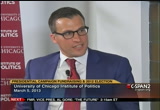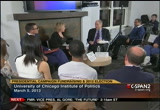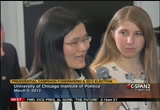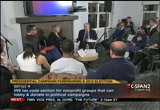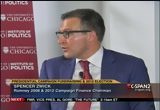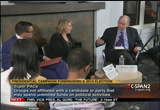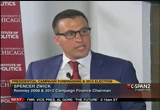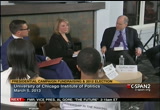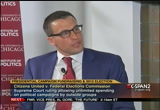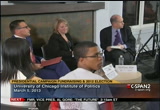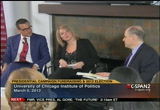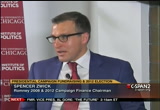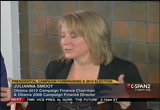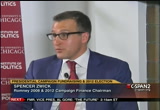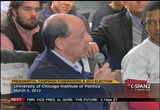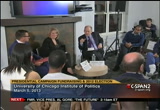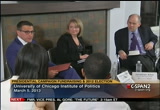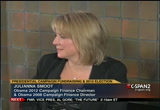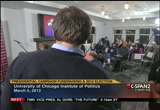tv Capital News Today CSPAN April 1, 2013 11:00pm-2:00am EDT
11:00 pm
millions of people that a company like general electric does. there will be many more smaller companies that me less ma less collaborative consumption and technology and social enterprise. >> how does that negatively affect a walmart or brick and mortar traditional company that employs millions of people, you know, responsible for a big chunk of our economy. how does that trickle down? >> guest: they are reshaping a
11:01 pm
lot of the fundamental of the economy. we have a different value set that cares about commitment to the environment. it has a social backside to it in some way whether it's a commitment from the beginning to being green. the lowest car ownership in an a long time. these are the -- [inaudible] these are the fundamental concept. what if people didn't think it was valuable to buy a home. for a long time we based our economy on home ownership and marriage and all of these things. >> yeah. >> so i'm not the economist i don't know what the how that is going to france form the economy. but it's something that economists should be paying more attention to.
11:02 pm
and politicians should be paying more attention to. >> host: what kind of effect does facebook generation and a generation interested in creating facebook-like companies. what does that have on the walmarts, you know, these traditional brick and mortar corporations that employ millions of people and responsible for a huge chunk of our economy. how does that trickle down? >> they are transforming the fundamental of our economy. if you look at at way they value how they're spending their money, if you look at home ownership, if you look at marriage, and automobile ownership. they are at the lowest level in
11:03 pm
history. this generation is really pushing that kind of restructuring of the economy and we're going have to figure out how we handle that. >> it sounds like it scrolled a big impact. >> it will. this is not what economists -- this is not what we base things on. we have never had asked the question what if people didn't want to own or buy a home. >> host: we've been forcing it on people. >> guest: exact will. test interesting part of the economy. part is the valueship for since the 1950s we baked the idea that home ownership was equivalent with community and marriage was e qvc lent with -- equivalent with love. finding someone you love to spend your life with they say yes. is getting married a piece they aren't as enthusiastic. people will continue to get married.
11:04 pm
there's a shift in what it mean to people. i don't think it means to this generation doesn't respect the institutions. we view the fundamental essential thing of what they are about community and love as being important. and if you look how we're finding community we don't need to be in a house. the people who live next to us and we can rent homes and be part of a community. and thing is a big difference that we're going have to figure out how we do that. if you look at the companies people are creating almost all of them have the social value inherited. there's not almost not a single company that doesn't have the social value whether it's, you know, there being a green company or whether it's sort of bringed to the core. if you look at facebook.
11:05 pm
no company that has ever gone public said that before. say what you want about them. they are a company trying to make money. that says something different how the generation approaches business and what business is for. >> host: even walmart has gone green in many markets. >> guest: and the result of -- say they will switch brands. they will stop shopping somewhere if they find a brand that shares their value more than a current brand. they are willing to work for companies that for the pay them less if they have greater social impact. it's important to the generation. it's not lost on the big company. . >> host: it's coming as a result of free market pressure. they are shopping elsewhere and voting with the wallet and not just social pressure and corporal pressure. >> guest: right.
11:06 pm
we have to take back implead. independent media is what will save us. the media are the most powerful institutions on earth. more powerful than any bomb, more powerful than any missile. it's an idea that explodes on to the scene. but it doesn't happen when it is contained by that box that tv screen that we all gaze at for so many hours a week. we need to be able to hear people speaking for themselves
11:07 pm
outside the box. we can't afford the status quo anymore. from global worrying to warming. producer of democracy now amy goodman taking your calls, e-mails, facebook comments and tweet in-depth three hours live sunday at noon eastern on booktv on c-span2. >> host: i want to return to something we were talking about and that's the impulse to sort of reject even if inadvertently traditional institutions like marriage, for example and home ownership. he has a book out what to expect when no one is expecting. st it's an antiview of not a population boom but a coming population implosion. and the responsibility that they will have for that.
11:08 pm
what messages do you think they would respond to if one wanted to try and encourage those traditionals institutions again, marriage, home ownership, et. cetera. >> guest: i think on the issues of marriage and home ownership. we have to se a culture more authentic around both of those things. they care about authenticity. when you think about how real estate has been sold and how the commercialization of the marriage try and the -- industry and the economy around marriage. i think that has seemed to generation that was looking to find love perhaps later in life or looking -- you know, the second generation of people going to the experiences. and i think this generation just seems very phony. it seems very over the top. it seems -- and frankly people in the real estate business
11:09 pm
haven't had to answer the question why should you buy -- why is it important to buy a home. they just had to be able to convince you why this home is the home for you. and people similarly people selling cars have never had to convince people you should why you need a car. they said you should buy a ford. not a chrysler. so that is the challenge. they have to wrestle with the fundamental question which is admitly difficult for industries not having to do that. it the generation is doing this. they are forcing disruption and forcing industries to think about the things in a few way and do hard work on the issues. this is what they have to do. this is not a generation that is just going sort of sit there and accept business as usual. >> host: let's talk a little bit more about digital media, social networking. one of the first things people think about when they think of
11:10 pm
ma less interest in social media and social networking bhap kind of lessons should everyone else learn about that kind of technology and that kind of communication? >> host: they actually straddle the line between being born in a world where they didn't have smartphones initially when they were born. they didn't have -- they didn't, you know, spend high school on wikipedia. they sort of had the ability to sort of be grounded initially in the predigital world. they did the first research project in library. they understand the basic fundamental. yet at the same time we have grown up alongside the technology. i talk about it in the book, the future that is the way we grown up with technology. it's sort of like a good friend. we have been the early adopters and the people that pushed the technology forward and they have been there at the key moments in our life and development.
11:11 pm
there's a symbiotic relationship. will be a first adopters of new plat tomorrow. we'll be able to seamlessly incorporate them to our lives. and what we're doing. for other generations, it doesn't mean that they can't learn how to use those. people of any generation can learn any of the platform and people of all generations are being successful on twitter and facebook and everything. what is different, you know, the arab spring, i think it's a good example of change. people all over the middle east of all ages have been -- for some time. it was young people able to light that spark. in large part because of their awareness to the rest of the world because of their technology access and also because they saw something that other generations didn't. they saw the ability of using these tools and it came intuitively to them that digital tools could be a way to scale their impact. and i think that ising?
11:12 pm
-- something that other generations don't have that sort of intuitive i'm going go to this. this is the way forward and that ability to be sort of the first responders. >> and you talk about the other generations and you reference mark and expert on technology and education, and just going read something that you say that he says. you say he goes on to point out other examples of the digital immigrant accent including phone calls to ask someone if they received an e-mail printing out a document to edit it by hand, showing people a, on the computer instead of e-mailing a link. that sounds like my parents. >> guest: it is. and you talk about in a good way. the idea of having an accent and the native immigrant divide is a good way of thinking about it. people, you know, other people of other generations learn the technology. there may in some cases be some
11:13 pm
kind of accent that is still present. when you have the accent it makes it harder to be a leader in the next generation of that technology. and that is the advantage the competitive advantage that they have. >> host: i think it's safe to say that social networking things like twitter and facebook have democratized you can be a news producer on facebook as a news consumer i can aggregate my consumption experience and pick out and economize the way i receive my news on twitter. i can follow certain people and i get only the news that i want. and i can filter out other news. how has it changed media? >> it changed the economic model of media. as, you know, you're a television host. as you well know, you know,
11:14 pm
freakily you probably do a somehow and you'll hear from shn a few days later comment 0 the show. nobody is watching it real time. certainly people in this generation the ability of what it going on online is a constant conversation. i have a -- i regularly check the hashtag on twitter and there was a report that came out a couple -- almost a week ago about now and how they are the most stressed generation. people are still talking about that and tweeting about that every day because some people are just coming to that news. so while there's a sense of real-time communication. there's also a delay. that leads to people always talking about everything and the constant, -- if you think about it like a tennis or volley back and forth between consumers and producers and how new content rises to the top. i think it's made it
11:15 pm
particularly difficult for the political system because there is no ability to pause. we used to be that we had a media system where at the end of the day everybody went to bed. the show was over, you know, the newspaper editors did the work. now we have a constant feedback loop which i think particularly for other generations is overwhelming. >> host: overwhelming for my generation. absolutely that lack of pause and that continual news cycle makes it really exciting. in fact pace there's something to talk about. it creates a never ending loop of experience where ideas live forever because you're constantly referencing back to them. and you're constantly trying to keep up with developing moments. >> guest: yai. i think you have a sense that everybody can have a different take on a piece of information. and that -- and a sense so you
11:16 pm
to comment. i think that as, you know, journalists have got anyone to this initially a lot of journalists were uncomfortable about wading in to the world of twitter because they said -- i'm a column nist, i write my column. i don't want to comment on everything in 140 characters. i think there's an overabundance of content. i think one of the changes of the generation is figuring how to cur rate and cur rate well. there's a opportunity for that. >> host: that's a good point. let's talk about the political moment. let's talk about occupy wall street. that has a big affect on them. it was influenced by them in many ways a project. it was successful or was it something of a failure? >> guest: it's important to point out tat occupy wall street movement it was characterized as a youth-driven movement. was actually not dominated by young people. a handful of the voice and
11:17 pm
leaders were young people. they did a sort of analysis of who was at the protest in new york. only 23% of the people there were under the age of 30. so i think that is something that we should keep in mind. there's been a long history of youth being associated with protests. >> host: right. >> guest: when people see protest they assume youth. there were some young people there. i think what the movement did was it help push a little bit of a dialogue about the relationship between business and people. the relationship of how people felt that corporations, how people felt about finance. i think the conversation was already started before that. but i think one of the things that was interesting as that movement was going on, you saw
11:18 pm
them who were there at occupy wall street swraiting the life of -- celebrating the life of steve job. his death took place at the same moment it was going on. it was a great way of showing the way that they believe that corporation are a part of our world while they can stand and say we disagree with the financial placket ises. with can celebrate a great corporate tie tan and leader and innovator and thinker. and be able to hold both at the same time. i think it's one of the hall mark of the generation. we request hold in our head. we don't like the practices, we celebrate the great things that american business and american leaders can do. >> host: i think a lot of people will remember looking back on occupy wall street. there was a lot of news clips of, you know, someone putting a microknown a camera in a young person's face and asking why
11:19 pm
you're here and young people not being able to twine the point. and actually that might have been by design and that might have been a success a mark of success eric copper writes in "true believer." that successful mass movement are vague. they are undisciplined because if you're specific about your goal, once you reach it the movement dies. the movement is over. and in keeping the goal of occupy wall street a little vague, maybe that helped to prolong its life. >> guest: yeah, ting hits the nail on the head. if you think about how social change took place in the '60s if you dissipated once the war was ended and the civil rights act was passed since so much of the activism of people in the jen race have been pointed
11:20 pm
around those two things the movement for social change dissipated in a lot of ways after that. people felt free to go back amongst their life. in this generation there's a more sustainable activism this idea we can push thing forward through more vague kind of ways and occupy wall street was one example of that. in that it helped push a conversation, i think today can be just as important as pushing specific action. sop of -- so much of our world is driven by the media and conversational loop. i think it plays an important role. >> host: what is the next or -- what is on the horizon in term of activism and issue? what is the next big thing? >> guest: i think we're seeing more and more action around energy and climate change. we saw recently this the protest in washington around climate change, which is one of the
11:21 pm
largest allegedly in history movements around climate change. there were a lot of young people participating in that. at the end of the day they go back home and they do things in their daily lives that help push that. i'm excited about with a young people are doing in energy. i'm really -- i'm optimistic about peopling instead of being institutions environmental lobbying for more federal money to be appropriated to, you know, alternative energy research. they are doing it. they are starting crowd -- there's a great company crowd fund -- crown funded itself to existence basically that is doing solar energy and stuff. a lot of them are started by the young people. way would we wait for the government. it's a big political fight. we can do it on our own. we can be entrepreneur and find ways to go that. >> host: that's a perfect segue. that impulses feels intingtively
11:22 pm
private sector and conservative. and conservatives have had a tough time reaching voters. and marketing the message to me less thannial voters. impulse that might have healed well to the group of voters. >> i think it is a possible opportunity for republicans to help engage with young people more. ic the parties need to be aware of the fickleness of the generation. this is not a party-focused generation who is going support democrats or republicans through and through. there are a lot of opportunities. i think the impulse towards solution, the impulse towards
11:23 pm
private sector solutions or non-profit solutions, i think it's important it's important to note is driven by the frustration with the politician. so i think the best thing they could do would be to show more openness and show more on particularly on some of the social issues. >> host: let's talk about the social issues. you know, some have described it to me. and to be honest a particular project of interest to me. i want conservativism, you know, as a partisan. i want conservativism to have better message for actually, you know, all of these voters. but it's been described to me the conservativism needs to reconcile with gay marriage, weed, and twitter. is it really that simple? >> guest: i don't know that it's that simple but i think each of those things is
11:24 pm
representative of set of issues on which conservatives could be doing better, and frankly i think some democrats could be doing better on some of these issues. i think that, you know, millennia believe in government. they believe there's a place for government in looking out for people which is obviously a fairly liberal concept in theory. and then they also believe we should have a responsible fiscal policy which is a conservative idea. they also believe in gay marriage. we want to hold all of those beliefs at the same time. both parties need adapt toward that sort of middle ground more if they really want to find a home for millennial voters. that's what represents us. it's not wanting to have to choose between a set of beliefs and the other. >> host: interesting. women, there's that -- well, there's that old adage if you're
11:25 pm
young and you aren't liberal, you have to heart. and if you're old, and you're not a conservative, you have no brain. what would millennial say to that matrix? >> guest: there's a lot of talk that ultimately all of these me less millennial when they grow up will become conservative. i think the history -- well that phrase there's something asked about it. i think the history doesn't necessarily show it. it shows that when people's impression of the parties and values are formed when they're younger and they tend to stick with them for a long time. so republicans have a window that perhapses is closing very quickly to be, you know, be impression able on the millennial and reach out to them. it has to be more than hip-hop lyric and it has to be more than sort of just saying hey, i'm cool. because that is so fake.
11:26 pm
that is so fake. i see at love politicians doing that as a way to reach out to young people. young people want to be spoken to like they are adults. i think has what barack obama did so well in 2008. he -- spent a lot of time going to college campuses and asked people for their vote. i don't think politicians have done enough. they have gone to a college campus and said i'm cool, great to see you. but actually asking young people for the vote in the same way they ask people of other generations. >> host: if they go the college campuses at all. mitt romney was criticized for largely avoiding college voters and giving up on them and writing them off. >> guest: i think the history is when you go to young voters and you reach out to them, you have a chance of getting their vote. and, you know, barack obama even in 2008, this was one of the most fascinating thing about the 2008 campaign that was undercovered.
11:27 pm
he ran a program in iowa geared around high school students. in iowa you can vote in the primary if you are 17, and will be 18 in the general. so he went to all the high schools targeting high school seniors and and juniors who are 17 and engaging them and that was one of the reasons he won the iowa caucus because of this unprecedented engagement on the parking lot of 17-year-old -- part of 17-year-old high school students. >> host: wow. with two 16 on the horizon, never too early. >> guest: yes. >> host: what does a democratic would say if hillary clinton or a republican running let's say it's chris christie, for example, what do they need to keep in mind when targeting this particular generation of voters? >> guest: i think this generation wants to hear a positive message and wants to be
11:28 pm
brought to the table. because this generation has been put on the chopping block in a lot of ways in the political process. we have been left out. i love to see them engaging more young people in their campaign. one of the reasons that president obama young people worked on campaign. there were more people who worked on political campaign in 2008 than any election in history. more young people were engaged in that process. and a candidate who can help bring the people in really can help usher in a movement. if you look at what happened in 2008 in the long run of history, i believe that the campaign of president obama will be more important to the election of the generation. that campaign engaged so many people in who have now gone on to do so many different things and created a spark. i hope that in 2013 will can be another movement like that. that is lead by the candidate republican or democrat or both.
11:29 pm
>> host: you talked about ways in which politicians like barack obama engaged in popular culture. some do it successfully, some don't. but let's flip that around. how accurately or fairly does popular culture judge and represent and depict millennial. >> guest: i don't know if you have seen the netflix series, "house of cards." i love it. a lot of people got their grounding in the politics watching the west wink a long time ago and older millennial watching "house of cards." it's an interesting reflection. both deal with young people in politics in the west wing. the people running and very idealistic and optimistic. which i think is a reflection of the spirit of the time and the possibility of politics. then you see, you know, the zoe
11:30 pm
character in-house of cards who is an opportunityistic -- opportunistic and entrepreneurial person who taking the different opportunity and trying to work the way through the system and playing the system and using it to her advantage i think is more perhaps more representative where millennial are at. it's more realistic and effective how everybody peoples about politics. they are good bookends how the generation feels about politics. >> host: what about, you know, i think when maybe a lot of older people think about millennial and popular culture, they think about jersey shore or they think about girls which -- almost tongue in cheek makes fun of the young hipster. are those unfair sort of shorthand versions of what young people are like today? >> guest: the generation of 80 million people. you'll find people who represent
11:31 pm
everything. exactly. [laughter] there's -- that should not be something that is criticized. you find partyers. you'll find it in any group of people. when we talk about generations, we're talk abouting what are the most important things that are happening in this generation that are happen having an impact on other generation. have been able to muted on a television show and write it, you know, on and bring that pi pass bypass the traditional television culture to present different image of star of a television show we don't normally see. someone who is not a size zero. i think that has really been a
11:32 pm
good thing for the power of how the generation can create television show and be part of the culture and dominating the conversation of all generations having. >> host: notion who are other millennial leaders either entrepreneur or politics or pop cumture you think are going to be paving the way people to watch. >> guest: in the book there are a lot of great stories of people doing that. we may snow some of the more sexy examples. there are two great guys in ohio that i talk about in the book. mark and taylor. they started an organization in their town when they saw the unemployment and the economic crisis. it went adds high as 19%. they came home and they are devastated by what the economy had done to their hometown. they start an organization called energy clinton county to
11:33 pm
transform the residence of the community at the age of economic change. they brought young people back to be fellows and teach flour resists and -- florists and shop owners and how to use social media. and encouraging residences to buy local product. the great example of how young people in not in cities not in the spotlight are doing this kind of hard work to move issues forward and make impact. and i think people like them are representative of people all over the country cho who have been newly empowered to create create change. >> looking back over the course of history, every generation is known for something. what do you think the millennial generation is going to be known for in fifty years? >> guest: i think we'll be known as the people who pushed the country and the world in a better direction. who helped bring the world in a little bit of course correction
11:34 pm
from where it's been. i don't think this generation will be, you know, the generation who will solve every problem in our world. i don't think any generation can do that. we are definitely on a good course to help change some of the ways we are thinking about our world and be more responsible. to to be more socially minded. the way we pushed businesses. the successes we've had of electing presidents, top ling dictators all over the world are impressive. creating companies connecting a billion people over the world. >> host: it will be interesting we'll be interested in seeing how this generation progresses. and i know we'll be keeping an eye out. david burstein, thank you for joinings us. >> guest: thank you.
11:35 pm
coming up on c-span2 a discussion on the impact of technology on privacy. then the campaign finance managers of the obama and romney campaigns talk about the 2012 race. that's followed by booktv and prime time with former vice president al gore discussing his book "the future" on global policies and the reshaping of the world. and authors samuel greg how the u.s. can avoid the financial issues facing europe. in the next washington journal, michael of the "boston globe" on the newspaper reporting partisanship in the u.s. senate. we look at the infrastructure with the american society of civil engineers. and we'll discuss the use of domestic drones with sara who covers national security issues for the "national journal." "washington journal" journal is live on c-span every day at 7:00 a.m. eastern.
11:36 pm
glrnlgt former treasury secretary will be in washington tuesday for a discussion hosted by george washington university. and fortunate magazine. if you can watch the remarking on the significant economic, political, and environmental changes in china at 4:30 p.m. eastern on c-span. we have to take back media. independent media is what will save us. the media are the most powerful institutions on earth. more powerful than any bomb, more powerful than any missile. it's an idea that explodes on to the scene. it doesn't happen when it's contained by the box, the tv screen that we all gaze at if so many hours a week. we need to be able to hear people speaking for themselves outside the box.
11:37 pm
we can't afford the status quo anymore. from global worrying to global warming. author, host, and executive producer "democracy now". in-depth three hours live sunday at noon eastern on booktv on c-span2. a discussion on ad targeting and profiling and the implications for privacy. this is part of the university of colorado law school technology and privacy conference. facebook's privacy and public policy manager was among the participates. it's an hour and ten minutes. >> we're going -- first of all, thank you to jewelry and julia for getting this going. the first panel as described in the pamphlet is the threat and benefit of new technology. and i just want to say one minute introduction to the
11:38 pm
thinking behind that topic is our kick off topic. then i'm going turn it over to my panel to get us going. we want to start -- obviously the whole day is on technology and privacy. we wanted to start with a discussion of new technologies and/or changes in technology that are either worrying people or that offer promise. we in particular didn't want to start by just lit any of here are the terrible things either, you know, one site or one entity is doing. and pile on but you really look in a balanced way at both the ways that canings in technology are causing privacy threats and potentially creating solutions for some of the things we'll be talking about the rest of the day. in fact looking back at the
11:39 pm
discussion that jewelry, commissioner and jewelry just had. they're talking both about potential problems in the mobile space, for example and potential solutions like "do not track." that's probably the most technological solution focused on the most. that's the goal. if you haven't been to a panel discuss before, let me give you an overview of how to functions. at least the panel will have comments from two of our presenters and then responses from the rest of the panel. the panel will have a discussion for some period of time, then we really will leave significant chunk of time for questions from the audience. we are slated to end this panel at 1:30 and make sure we have enough time for your questions as we go. we typically have a silicon tradition that we asked that the first question be from a law
11:40 pm
student. if you're a student in the room, please be getting red i. i'll have to call on you, which is not good. that's kind of the overview of our panel will function all day. we're extremely excited to vol of a our panelists on the first panel as panel with us. i'm not going to -- another tradition we typically do not introduce everyone on a panel. you have the bio in the pamphlet. take a look. but i want to start with some comments from both ryan calo and -- they have been in a conversation between the two of them leading up to the panel and are going each make some depend -- comments in sequence but dove tailed together and the rest of the panel have a chance to respond. ryan, i think you'll go first. we are going to stay seated for comments. it's a little easier on c-span.
11:41 pm
you're up. >> okay. thank you, scott. thank you for inviting i have to say that i'm so impressed with silicon flat iron as a community building and forum. i always find that the programming here is sophisticated at the same time very assessable and brings together lots of people. thank you very much. i'm excited to do this. what i want to talk about is part of a project i'm working on about changes that advertising technology and marketing. okay. so historically, you know, historically, you know, i mean, technology historically the last few years. right, historically as the online advertising technology has engaged in what i want to call ad matching. it's the idea that if you're a democrat and you ski, maybe you get ads for subaru. [laughter] for instance. and the idea is that, you know, there's all this technology and
11:42 pm
effort being spent on making sure you connect with the that'd is best for you and the advertisement reaches you. and, you know, there are dangers in that; right. and so joseph's book in particular, i think is a nice exmoe suggestion. people get segmented and sort of redlined by the profile. you won't see certain kinds of ads. there's benefits. and the benefits involve you seeing more ads subaru as opposed to a lerks lek sis. i'm thinking about how it's changing. one of the things i'm thinking about is the thing i want to talk about today. that's the change from ad matching to persuasion profiling. so what is persuasion profiling mean? well, the idea is that all of us, you know, are biased biases in way we think about things. all of us are susceptible in
11:43 pm
different ways to deviations from national choice. so for instance i might be a sucker for authority. so if you tell me that nine out of ten experts agree that it is a right tooth paste for me. i might inclined to do that. he doesn't care about authority it drives him away from the product. what he cares about he's worried about scarcity. if he hears this particular tooth paste is only available for a limited time offer, right. he's going to be more likely to purchase that. and these things are actually discoverable about us. you can figure out you can figure out not sort of the end but the means you should persuade consumers and folk like martin in particular and some of the colleagues working on techniques that permit you not only to match the right ad, the
11:44 pm
subaru ad with the democrat but also the pitch the ad in the they is most likely to influence that particular consumer. i find that to be potentially concerning. and not to have some of the kind countervailing benefit you have with the per ad matching. i think it's one of three different ones i'm going to give you. q & a that make me feel like what is happening today or what is going to happen in the near term is actually different in kind from what happened before. >> i think a good segue to some of the stuff i want to touch on. according to highlight the type of -- this sort of persuasion.
11:45 pm
and so one which you describe is personal. knowing ryan and his -- [inaudible] for authority. and the other is kind of the -- only make by having d.a. about a lot of -- we futured on this last night. a technique to bring back the people. it's an interesting technique. they put the maximum spend before you leave. you go home angry and bummed. what they do is have the loimty cards. they know that ryan cap is
11:46 pm
$3,000. when he's down $3,000 they'll send him a free room and ticket to a show. not keep him playing for longer. people tend to remember the last point of an experience. the first and last point. they try to color the last experience in a way that will leave him feeling i was down but i had a nice show.
11:47 pm
both the general and personalized type of plo filing and -- profiling and targeting that currently exists i had the pleasure of working with the "the wall street journal" on a couple of stories recently regarding how companies or how personalize profile consumers information about consumers in order to one example was a story about how certain car manufacturers will, for example, profile consumers by name by e-mail address directly, and kind of track when you can kind of send a note to the.pro dealership to see a car. the dealership, the service will be able to tell the dealership all of the cars you looked at, what model, what color, how
11:48 pm
frequently and how often. when you go on to the dealership, the dealership already knows. the dealer standing there the car salesman knows your preferences and what you're looking for. and so if you want to get to a market exchange. you're willing to pay the dealership knows you like the red model. you looked at it ten time. that's the one they want. they can stick on the price. that makes an unfair interaction between you and the marketplace. you and the dealership, in my opinion. the other example was more recent we were looking at companies that would, for example offer different prices to consumers in different locations. we found, for example, sometimes would offer different prices for staplers based how far you were from a competitor's store. if it was further for you to drive to the competitor's store.
11:49 pm
they would give you a -- further for you to get to the store they knew that you were locked to staples and they would give you a higher price. some airlines some travel sites would offer different prices for car rentals based on the type of device. ipad users get neither a discount. sometimes a mac user you get a higher price. it's not perfect pricing, it's generally trying to make mac users willing to spend more on luxury goods. and this goes down to even some of the such that they were talking about earlier around credit card offers, for example, discover would offer different offers to the different consumers based on whether they come from certain locations or, you know, different profile about their activity. and so i think in this sense of
11:50 pm
using data about consumers from a individual's perspective as well as a broad range of general behavior. it's an insymmetry where people the focus data are able to kind of approach the marketplace with kind of benefit on their side in order to extract the maximum prize that consumers is willing to pay and create an asymmetry in the exchange. in the economic term perfect pricing of first degree would allow you to extract almost all of the social surplus or the economic surplus from the data subject to the data holder. i know, the willingness to pay for something. i can kind of charge you that willingness to pay with regards to whether or not someone else would be willing to pay lower than that. it creates that dynamic with how we approach technology and fairness with with regard how to our online.
11:51 pm
. >> any my view also gets to the hard question in an interesting way. the harm story with ad watching, let's say. is not as obvious. the idea is you saw one ad versus another. it's not clear how you might act. the story here you're paying more for the car. and even though the economists in the room might be thinks that's efficient. merely because of the surplus goes in one direction versus the other. it's an ineffect tran action. from a consumer's perspective, right you are potentially harmed by pieing a higher price. you are being harmed on the basis of information. it's something i've been referring to as objective privacy. you are giving up information about yourself. that information unbeknownst to you often is being used on the story in order to harm you in a concrete economic way. frankly. and so i think it starts young it's true it's one of the
11:52 pm
factors in it it may improve the harm story to a large degree. what consumers don't realize they are -- symmetry in place that know what my willingness to pay is and able to extract that value. >> all right. right. let me turn to the panel and can go to anyone you want, actually. whoever jumps in first. general -- comments. i've heard couple of things, ryan, persuasion profoiling and the idea that -- profiling and the idea ad market is changing.
11:53 pm
it's getting more sophisticating. it's starting focus not just on whether ryan is a democrat or not. what is persuasive to you. and change what you see so you can see the authority reference or you see it comment from a friend or the expert or whatever. one thing. secondly, i heard you focus on here is -- that's an -- we're beginning to pray -- prey on psychologist weakness or diocese. the second thing i hear, particular focus on is maybe information is getting exacerbated not diminished by the online information. so the seller is beginning to know so much about you they didn't know before that in a way that when you use the -- that feels unfair. but that is sort of a threat
11:54 pm
there. we have the scomtion piece and information piece. comment, anybody? from your perspective on facebook . >> sure. i can start. before i start though, i should thank you, scott for inviting me. i think it's a very exciting and interesting program. having the information is valuable to help us get through and figure out the right way to address these. thank you for doing it. >> thank you for coming. >> absolutely. i think where i want to start is highlight a commonality or theme i heard in what ryan said and also in commissioner's remarks earlier today around the idea of what i would call transparency. you refer to it that way as well. last time you taunt information but i think we are talking about the same thing which is that you know what is important is, you know, there's nothing adherently
11:55 pm
bad about the information. there's nothing bad about going a car dealership and buying a car and getting a price. what your focus is on people don't necessarily know how it's happening. they don't know what is going on. as you said, i work at facebook. it's something we think about. when we target ad we have privacy policy that goes in to great detail. we try in a lot of ways to be really clear with people about you know what information we have people can look at the information we have we're using for the purpose. whenever you see an ad it says click the words about the ad you get lot of information. again, i think it's important do that. i think it's important for people to have transparency to the way their information is being used and what that e echo system look like. that's probably an important place to start. what information should people have and you know what is the right way to communicate that? there's not an easy answer.
11:56 pm
i don't think there's a single answer that works across the board. as we don't think about it in the balance of the panel, i think that's a theme i've heard. i think it's an important one. i also want to, you know, look a little bit at some of the bsh bryan i know you have done work in looking at harm. it's important to to think about how we regulate or self-regulate or whatever the context is. but i think when you're looking at things like price discrimination, when you're looking at, you know, i try get a mortgage and because somebody if thinks i am a category, i get a higher or lower interest rate. i'm not as, you know, we don't play this that space. i'm limited in what i know about it. i mean, i think what you're talking about really is there are things that are going on that, you know, there's discrimination going on. we have description laws. i think one thing important to think about as we look at the
11:57 pm
issues and look at the things what do we think on the good side? what do we think on the bad side. it's not technology specific. it's not the fact that you're using a website that really create the issue. it's not the fact you provided information and electronic way. it's that, you know, we have uses of information we're concerned about. we should think about that. in a lot of cases we have exists laws to address those. that's an important point. transparency addresses a lot of -- if they ask see what the information is have the ability to control it. and if the companies that make the claims that are being transparent or held accountable. i think those are building blocks of what the path forward is. we certainly at facebook try to do those things and try to be clear with people and we can
11:58 pm
talk about that more. i think, you know, i guess my comments are intended really to synthesize so far. and highlight maybe a path forward there. >> should there be about the price . >> what? >> about the ad. should there be about this price? >> so, i mean, i don't know. ting fends on the content. it depends on a lot of things. it's actually interesting; right? we have to draw a line somewhere like you, you know, you talk about in some of your work you talk about sort of information being used to show differents to people. i think my view and, you know, we can disagree about this is that the, you know, targeting ads, you know, you come to facebook and you say that, you know, you're available as in washington, d.c. and we show ads to men in washington, d.c., that are targeted on the basis. you're getting ads more interesting to you. more relevant that something that relates to an restaurant in san fransisco.
11:59 pm
12:00 am
we can give them better notice. in other words if you want to send somebody a text you can convey information in a way they're going to understand. for instance if you know they're a visual learner, you can show in a visual way. so on. i think there's two kinds of incentives i worry about here. if you have regular ad targeting and then super ad targeting, a persuasion profile, and persuasion profiling is more lucrative. now, maybe transparency can correct that problem, and i'm hopeful it can. one issue it turns out that many techniques, if you tell people you're doing it, it doesn't work. right? nine out of ten analysts agree you should buy colgate. and so the incentive for
12:01 am
disclosure are not terribly good. and so i'm hopeful about the role of transparency. >> other examples, walking into -- i'm assuming when you tonged about the car dealership getting all this information, that you're saying the physical car dealer, when you walk in, know what you're doing online through the web site. to what extent is it transparentty -- you don't know they know you've been on their web site. if they say to you we know you were on the web last week and you like that red model. a., it might not work. but does that solve your problem or does transparency not get you there? >> this isn't about, because you're online or digital. kind of it is.
12:02 am
i think what changed the way web browsers have been censored, and third-parties that you don't have interaction with being able to record and monitor your activities gives rise to a larger number -- a larger amount of data available about you to be used for these purposes. one of which is, for example, when you visit cars.com, a third party you are not aware of and don't know about is recording that activity, and then selling that activity to a dealership that you physically walk into, and you don't have any -- it doesn't really stretch that the dude standing there selling you the car was also on cars.com last week when you were looking at the mazda. so maybe transparency might help in terms of educating people and make sure they understand, and there are all these context violations of information. information online and follow
12:03 am
you into a store and follow you into a car dealership. maybe that might help itch feel like the level of sophistication, and instead of going to amer chant side are meier than the consumer side to understand these things. but the example is, i might be able to -- by understanding all the ways my data is tracking and monitored are i might be able to, in that negotiation with the car dealership, get $100 benefit when buying a car for me as an individual. the incentive on at the dealership side for all the thousanded of people they sell cars to, a thousand times that $100. so there will always have more incentive to do this better, and in fact more time and resources into this sophistication how the system works and consumers won't have the incentive to dig into,
12:04 am
and this is where i think transparency would fail. i feel like -- i don't believe might be the end of solutions. >> i think -- with respect to the transparency issue, as i'm listening, i'm thinking, what kind of transparency would it look like i'm providing notice that i'm going to use your information to charge you a higher price. that would be the -- then we also talk about how notice and note has gotten to be out of hand and the notices are so accept blue -- acceptably wrong. i would rather write a shorter policy that makes sense but as we get to the granular in transparency, it's difficult,
12:05 am
and the transparency and notice are cork but how far do you drill down and as far as the benefit to the merchant and the impact on the individuals, the consumers, it's going like this. just -- i think that at this point where we're talking about the persuasion profiling versus just the ad batching. >> let me go back to the question as to what is wrong about all this or what's the harm? i teach negotiation, which is the crux of -- for my transactional work and how markets are moving and changing. i worked in a rug dealership in istanbul. a rug dealer can look at you, anybody the audience and say, you're from auckland, and they know that because of your shoes
12:06 am
and the brand of clothessor wearing, and they're incredibly sophisticated at targeting prices at tourists. right? that's how they make a living and the tourists have no idea they know this. they get off a cruise ship, walk in and think, i'm getting the same price as the next dumb tourist. they're not. not at all. and neither is the person who walks walks walks into the car dealership in the old world, because they looked at the car you drove in on, and they try to firing out who you and are what you're going to pay. what's different. >> that's an excellent question. i was trying too frame it along fairness, and you might almost kind of -- framing whereby --
12:07 am
might have 20 years of experience but is still one guy and still -- it's my wits against his wits. i know how to negotiate. it's based on wit. but as it turns out, it's him and all his friends and all of the other -- where i've gone to and what my negotiation tactics have been in those contacts? then it starts feeling like it's out of balance. and then kind of the level of disadvantage that the purchaser is put in, is quite a bit more. and i think it's maybe not -- >> a quick question whether you think technology can cure its own ills. you're talking about an abrogating data.
12:08 am
is there a market for or do products exist that allow consumers to better educate themselves to data pool and determine what the sellers are doing? your car sales analogy seems like a perfect one to me because 20 years ago you couldn't get online and look at the invoice price. the manufacturer's special retail price. all the data, what the last ten or 15 car sales in your area for that model were. and i actually feel as a consumer, sort of highly valuable transaction like that, i'm in a much stronger position now than 10 or 15 years ago. don't negotiate with a car dealer. i tell him what i'm going to pay. how much profit that will provide him and what a great deal it is because he just spent 15 minutes and made a sale. >> a great paper on this about contracting in the age of augments reality, the gist of which is that, which is the notion that consumers are empowered by technology to do price comparison they could
12:09 am
never do before. >> you didn't know that, though. >> how do you establish the price you're going to pay me? that what want to know. but that said, what we have here is an arms race. i'm going to go with a huge big company on this one, as winning the arms race. and i think see there are confines of economics. you could say, -- i kind of crib this from randy in chicago. imagine the situation where if i give my e-mail to ashkan he will send that e-mail to a third party and that third party will dispatch me so much. my privacy didn't go to the highest value user. i'm the highest value users and i didn't know it. i think that just to take the
12:10 am
rug dealer kind of example. compare that to the work of b.j. fog at stanford, works on something called keptology. computers have an infinity nate memory, they never get tired. you can change their appears and they can ava themselves of almost all the techniques an individual person can too. this is a whole. a theory suggest that computers can be persuasive in the way we're persuasive. so you know this one anecdote but -- maybe it will want kerr away from me -- but think about this one example. turns out that we're more likely to talk about ourselves to people who talk about themselves. we tell more to'em who tell stuff about themselves. computers, too. so there's a study suggesting if a computer says, i was made in
12:11 am
2005. when were you born? you're more likely -- if you compound that with the fact that not only can i know that in general people are susceptible to the notion if you -- i tell you something, you'll tell me something. maybe that doesn't work on you, maybe something else does. if it's an arms reassume not going with the -- arms e.r.a. i'm not going with the consumer. >> one more question. you talk about an economic model for innovation and for trading on privacy and that kind of thing. how do you value the inherent benefit provided by companies that offer a service that is popular and widely used for free, people use free e-mail, facebook pains, -- pages and the reason they can do that to some going is maybe with some degree of knowledge or not, some degree
12:12 am
of imperfect knowledge, consumers decided they want to be on that site and at it worth it them to receive an ad or see an ad on the side of the e-mail. how do you figure that into your economic model? >> i make this a benefit of platforms like facebook and others, and the fact you get all this amazing content for free often. we should definitely be thinking how important and invaluable that is. taken it to logical conclusion, however, it would suggest we place no limits whatsoever and that we not have any transparency because it's so valuable. got to be a point at which you draw a line, right? no matter how valuable it is, we still set limits. milk is super value but we don't let people put arsenic in it and you have to have a particular label on it. you wouldn't say milk is valuable. so there's got to be a limit.
12:13 am
>> going to make another shameless pitch for this. essentially we're into the economics here, and it's great. go read the -- i want to poll the panel before we get to audience questions -- pull it out of the economic discussion and into the technology discussion. for example, commissioner bill was speaking this morning and mentioning, do not track, and they got into a discussion of do not track. we can talk about that and/or other technologies, innovations, you're seeing out there that feel privacy protective, seems like things are going in a direction we like, and that are providing privacy benefits. >> one -- i don't consider do not track a technology. it's a policy control mechanism for opt-out, and so -- but a lot of my work has been on privacy, preserving technologies, those
12:14 am
controlled that you can -- david and i put together a tool to help them work with the transparency, and i don't want to pull it back to economics about for me it's always about incentives. and a lot of my research has shown that time and time again, when there are technical tools that consumers try to deploy to protect their privacy, the incentives are on the side of companies that use this information to circumvent those tools, and this is an example i flash because tracking based on -- the incentives on the side to circumvent those privacy-enhancing technologies, and unless there are repercussions or regulatory preventive -- mechanisms to prevent companies from that circumvent, i feel like a company trying to track me will always change faster than i will be able to defend.
12:15 am
>> make a shameless plug since he did a shameless plug. i think you've raised this issue that technology arms race, and i think that technology is absolutely part of the picture, but i think facebook is a good example where technology is not the only piece. we're clear about what we do and sometimes people like that, sometimes they don't. not everybody reads everything but enough people read it that people understand what changes we make on our service so people understand when we evolve, and we respond when people don't. so to say that companies are always going to be one step ahead, we have an incentive to have a really good relationship with our users, and if we were to do what you were saying and everytime somebody figures out a way to overcome something, we -- at the end of the day people won't trust us. i think there's value in what
12:16 am
you're saying and i also think there's another piece it to. which is we have an incentive, people realize we're trying to overcome their preferences mitchell shameless plug is to go -- >> here's the journal. >> there you go. i will be reading on the plane. my shameless plug you asked about privacy technologies and privacy-preserving technologies, and one thing we have been seeing about facebook is contextual control, and so the past month we rolled out a number of changes to our service that build on things we have been doing to make sure people have privacy controls and information and context that makes sense. so we have a really -- what i think is a good privacy policy to block information, but providing information in the place where people want it -- i'm not aware of another company that has done this. so now on the tool bar on facebook. you can click a privacy icon
12:17 am
where you have very simple controls to do the things that people want to do on privacy son facebook. when you post you control who is going to see this, and you have the ability ton facebook to type in what you want to do and we bring you to an explanation how to accomplish that. there's nor do nat area but i want to highlight it when we talk about concepts to address issues we have been talking about. i think putting information, about what is going going and wu can do about it is important and something we have tried to do. >> pick on facebook a little bit inch those disclosures, one of the issues got into trouble with, one of the cases i worked on, was, for example, when you said this information -- when you provide tools to limit the sharing of information, your definition of public was different than kind of everyone else's definition of public.
12:18 am
right? so i can restrict my friends only to whatever information i post it. so there's all these limitations, and as companies innovate -- perhaps those are hiccups. so this is a sophisticated -- people understand the kind of controls and the tools. i wonder, too people here understand, for example, that facebook, through this mechanism, through a company called data logic, shares information not just in a facebook concept but you mash up information from offline purchases like cvs drug stories to measure the effectiveness of ads. so this is the offbrand enhancement. i don't think most people would understand, and i'm not familiar with any kind of notice on facebook that would make it easier for me to understand that my item questions on facebook could be compared against my
12:19 am
offline behavior at cvs and used to provide -- >> i don't want to talk all about facebook but i want to respond. we have a number of disclosures where we talk about that. but i want to react to one specific thing you said because it's not accurate. we're not sharing information about that. we're not disclosing information. we're not giving away information about your purchases. i you understand but i want to make sure that clear. there are lots of places where we tell people how information will be used, but we try in those cases to do it in a way that is privacy protected and not exposing information we shouldn't be exposing in a way people aren't expecting. so i don't want to go down that rabbit hole. >> it's very hard to rely on transparency as a incentive.
12:20 am
>> before we start, when we were grabbing coffee, you were talking some about changes that seemed beneficial. do you want to -- as i go through trying to look for things you all are seeing in privacy can protective or privacy-advantageous, township come back -- i want to come back to that conversation. >> one thing i have been looking carefully is the development and advancement of facial recognition technology. it's been around for a long i'm and been used by government entities and law enforcement and soing for. now there's this transition into the retail sector, commercial sector. and what i see on the commercial side is there are definite benefits to the use of this type of technology, and what i'm seeing that you're getting a more customized experience, a better customer experience, based shop of the customization that can occur.
12:21 am
there's always that balance that has to be struck and that is the creepy privacy issue others and, am i being tracked when i'm in a retail establishment? and the -- there's a scene in minority report that is oft cited as tom cruise walks into a gap store and is greeted and told, based on your purchases, this is that you'd like. we're not there yet but there's direction -- it's going in that direction. there's newer technologies, mannequins with cameras in the eye sockets that tracks what customers are looking at. what brings them into the store, which way they turn and what type of information they're processing. >> so creepy because they put them in the mannequin. >> that's weird. >> if they put the cameras in the wall it would still be a little creepy. but in the eyes of the
12:22 am
mannequin? who thought to do that. i've seen them, too, and it's -- >> because it's less obtrusive but there are the cameras, too. >> little folds where the "his and is you want to keep looking. anyway, keep going. >> so there's stuff that come odd but there are cameras, and it's done used to be cost prohibitive. now becoming much more cost eeffective. so, $800 a month can get you these cameras in a store that can actually process what people are looking nat the stork getting all of this -- looking at in the store and gathering information. it goes back to the notion of the general tracking, gender approximation age, and the person, and this is joe smith and he is in the store and he was ear last week in our other store across town the day before yesterday. and when you're tracking the individual versus the general
12:23 am
population, either way, i think there are definitely some advantages from the commercial perspective to assist the customer and the consumer experience. and so of course that line has to be made and there has to be disclosure as to what is happening-what's going on, and how that needs to be so people can evaluate, that store has tracking. maybe i won't shop. there will that happen? maybe, maybe not. but if the information taken from the store is used to set up the store in a different way to set up where the sales rack is or where the -- how people track went the store, and different types of deals at different times in at the day, that could be very beneficial to the consumers. and so i just find that quite fascinating. >> we end up with this really basic question of, is it a benefit or a negative for your counterpart in the transaction,
12:24 am
a seller, any kind of seller, to know more about you, to know who you are? at some level the churn of information over the last decades has caused a lot of inaccuracy. i've heard some of you talk about, gee, if a seller thinks you're one kind of person but you're a different kind of person, and wall street journal did a series on that -- that could be bad for you, a worst credit card offer. so you have incentive tell them more about yourself so you get the good credit card. and it's moving moving into thee suppose. we're into the era of do not track or, yes, please track in the retail store in the car tealership in the gap -- i don't know if it's in the gap but you know what i mean in the proverbial gap. okay, i want to go to questions. from the audience. again, our tradition is to start with a question from a student, and it looks like we have one.
12:25 am
oh, microphone. we have to be disciplined. in the back. do we have more than one microphone? you're it. okay. >> my question goes back to the rug dealer and also to julian commissioner brill. the harm. so, in the rug dealer, two different ways to look at privacy, one is as privacy is the interest that is being targeted. right? so if my privacy is violated, i am harmed. then the second way we can look at is, as privacy is the aggravating factor that makes some other harm worse. like the rug dealer, he is doing the same thing anyway. he is going to visit -- you're going to pay more if he goes to the subaru dealership you like
12:26 am
the red one and they charge you more. the price is -- it was obtained through a privacy breach? somebody paying more than somebody else doesn't seem like a harm in the traditional sense. i'm curious what you think about the actual nature of the harm and is it privacy or some underlying change that is just being made worse by privacy? or breach thereof. >> i think that's an ongoing and difficult and quintessential question, and privacy is whether or not there's some kind of intrinsic value to privacy, may be wrapped up in autonomy or whether privacy is a stand-in for other values. so i come down on the view that basically privacy is -- privacy has to do with the consequence
12:27 am
office being observed. okay? and those consequences can be material in the sense you get a worse price, or they can be psychological, and in the sense that you experience a discomfort, and that what ties, if anything, what ties privacy harms together is the fact that they're wrapped up in observation. but other people in this space have wildly different views about it. i do think that there should be harm. i think the courts and regulators and so forth really shouldn't interfere with practices in the absence of harm, but at the same time i think we have been awfully stagey in our enter operation of harm and part of the concern is there's no limiting principle. the idea is that once you get beyond what economic harm you start to get goo loosey-goosey continental philosophy or something.
12:28 am
and i think we should be taking a crack at trying to expand the notion of harm, but at the same time preserve a limiting principle. i don't know if that's directly responsive to what you're asking. but that's my view. >> just to touch -- i think part of it for me, the kind of big hook is around opaque discrimination. so, that dealership example, or coupons, and you're willing to jump through the hoop to do a coupon or going to volunteer you have the option of getting the lower price if you want to go through it. and you can enact a cheng that will give you the lower price. but if you decide, because you're wearing a purple shirt or you can take off your purple shirt, but because of some attribute is intrinsic to you, must get this price, has some sort of impact on our sense of
12:29 am
self or identity that we can externalize these negative things from our persona, and the u.s. perception of equalness and fairness, that feels like a harm or discrimination because we can't do anything about it. >> the harm is that the individual doesn't know why they're getting the price, because i think one thing that we're sort of leaving out of the analysis is the consumer can walk away. if they're not inare trines sick by happy with -- intrinsically happy with the price they get. that's got to be the -- >> there are harms you experience quite directly in -- you know, you wake up -- you walk out of the dressing room, and you're startled by the
12:30 am
12:31 am
>> so substantial entry is the key to unfairness. and fairness is a practice that causes substantial injury that is not how will they benefit. the consumers themselves, that is already illegal entrants. the question is, you have been talking about economic -- price discrimination which was referred to as variable prices. i find that it particularly interesting example because of foot side every person who pays more is that some people payless in fact, actually, the overall system could be a lot more efficient at using build an overall sense in the first order, but also in the sense that you have a rule that says
12:32 am
that smokers pay more and non-smokers pay less. is that just as some people more and some people paid less. the rule itself make society better off because people are encouraged to stop smoking. the question is, when you're talking about harmon benefit come out you deal with the difference between a potential harm to one individual that might be outweighed by a benefit to another individual verses the overall collective assessment of harm, and in that sense that is not just a hypothetical concept but already with the sec looks at to what benefit of the policy statement that was issued in 1980 to consumers who work in competition so they already have a sense that this is collected. have you deal with that? >> i'm going to keep this to one because there are a bunch of tentative hands going up. anyone for response? >> sure. at think that outside of what we
12:33 am
talked about, arms and discrimination in general. again, opaque discrimination, discrimination people i'm not aware of, the other thing to consider is that while in perfect pricing you have one individual that pays more in an individual that pays less. without price discrimination you have what effectively becomes this economic surplus that often -- the people they're willing to pay more in-depth, for example, paying less. the company has to price of been in a point where they would sell some number of the good or a maximum number of the good on the price curve. as you start -- and this is like economy 101. the price curve. as you start adding prices you then start taking of those people that -- the people that were originally worried to pay more but ended up paying less, all of that, the money that
12:34 am
would come from that goes to the person, the merchant. that is how live from the economic harm. >> right by you in the back. >> i think the obvious harm which comes from the mission points out the fact that everything that occurs as a consumer read that a citizen, involving the lack of legislation, economic recovery? or the nation as a whole or non threats? just enough uncertainty
12:35 am
privileges letters to not want to have relief focus on those things. i would like to go back to what steve said, his opening a but a trout -- his travels and that we have some different viewpoints. a lot more about privacy as citizens and tell a want unbiased. [inaudible question] continuing with that concept. i read that the army investigation. at think that we are all assuming that there is no probability between the
12:36 am
corporate environment. let me ask you again the question because there are a bunch of other hands. >> the question is, is this really an economic floor for strength to consumers or are we addressing citizenship? >> civil rights. >> yes. >> taught me. >> the filter bubble question is a larger application that will we have been talking about. >> i'm just trying to think of which part of the question, you know, you would like me to try and address. at think -- i agree with you that there is a risk circlet
12:37 am
through the lens of fellow purchaser, consumer. that thing that is the orientation of this particular panel. at think in the more structured relationship between government and citizens there is a lot more positive locked in place that governs the conditions under which, for instance, someone can conduct a wiretap or obtain information from a telephone service provider, that kind of thing. also that places limitations in the ways people in positions of public trust and to have received privileged information from the government can disclose that information. so i agree with you that we need to be looking at all aspects of this issue and that privacy of the citizen is equally as important of privacy of the consumer.
12:38 am
at the focus is just ben because that is where the panel went, not because any of us think that that aspect is any less important. >> down here. >> would go to the left. >> my left. >> just a second. >> this is a question that i heard,. not going to be surprised, but it is about why i think as the commissioner mentioned, problematic, the problem is we don't know. somehow be okay.
12:39 am
in some cases. so i also, the class about their reluctance and savings comment. if you want to give people notice how you give them meaningful notice so that they are knowing what they should be letting? no, they're really all over the place. so the company really wants to give you notice to provide comment information. so that you have to show. the people on the outside are saying, unique tent tell people exactly, they actually don't
12:40 am
take. they don't go too much. by the time you are explaining exactly what you're doing your hitting and the point that you're trying. how do you explain to them what you're doing when you think there is a logic. how do we continue having hope with something like disclosure and transparency so that you are arriving at some kind of common way of telling people what they need to know. >> so, i think there are a number of really interesting things. i am going to invest.
12:41 am
the first, want to talk about this this idea of incentives. you said, the company's incentive is to give -- to give information that causes the maximum amount of information to be disclosed. in our case and don't think that is exactly right because we have -- obviously we want people to share. that is of a service is poor -- for. we think that's a good thing. at the same time want people to be comfortable and feel like have a good understanding because of the feel uncomfortable people locked out of it and all the things and we have bill will be useful. i think it is more complicated than just saying we want people to have comfort. people have come for so that they will be willing to use our products, but we also want them to feel like the understand what's going on. so that sort of leads to your second point which is there are a lot of different ways to provide notice. we can argue about how much notice to given what context.
12:42 am
i tend to believe that there are a number of different ways to provide information and that different people will look for emigration and different amounts of the information in different ways. and so our approach has been to try to provide information in as many ways we can think about the scale to the way the people look at it. again, there is not a perfect answer to this. so there is not a perfect answer because there are lots of different ways the information is used and preferences. consumers consume information and citizens consume information and lots of different ways. it's the right question to be thinking about. i don't agree that notices, that we should walk away. people are smart and if we communicate with them it will make this is the right. i also agree that there is a paradigm. most things i think about people if you explain it to them can make the decisions that are right. obviously in society readmitted judgment that there are some
12:43 am
things that are not okay. racial discrimination. even if you disclose the that is what you're doing that is not a cave. obviously there is a line there. in general if you tell people what's going on and give them a meaningful choice and people can make a good one for themselves. >> we could just measure up. the trademark evaluation law. you can measure whether people confuse a trademark. i mean we have talked about that our way is to measure comprehensive practices, the practice and that is closure and we can measure what people take away from whatever forms of disclosure this site offers whether is the video. at the end of the day you can say to you understand that this is happening, and you can measure that on many different axes. it's just like we do any other comprehension measurements.
12:44 am
>> it has come down to the front right. >> stand up. >> they can zoom in on you better. [laughter] >> so about discrimination, we have laws that prevent discrimination based on certain characteristics. bracer gender or sexual orientation, but obviously there are no discrimination laws that prohibit discrimination based on wearing a purple shirt or your propensity. so my question is why you think there are discrimination laws that have become outdated or
12:45 am
insufficient and if they should be amended to become much more valuable. the discrimination. you know, realistically this would be -- the number of dissensions that you can make in order to discriminate based on price and whatever other benefits camino. >> i don't know that discrimination is the right place to look at this. at think there are couple of different booze you can make a one is about more transparency which has the kinds of limits that are suggested. and then there is strengthening privacy laws. once you know what to do it you
12:46 am
can have those choices, another thing about the game out that i cannot say has developed in my mind, there are a lot of places and long where you end up imposing a duty on one party. the reason you do that is very often around information asymmetry. for instance, your broker knows a lot about your financial situation, about your housing broker knows a lot about your financial situation, what you're in the market for tomorrow with the other side is thinking and in the more you pay for your house the higher commission they get. so maybe you come in and impose some kind of limits. write down every single limit of what this fair dealing means. we don't do that. and so i think that there is a legal apparatus. i wish one of the things, you give me more ammunition against
12:47 am
scott or some. notwithstanding the fact that we have anti-discrimination laws, the right vendors perfectly edible to look at ways to and make decisions on the basis of the. and we don't prohibit that because we're not really able to do so. once it is scaled up and being done in a systematic way suddenly we are able to do it. and so that is why the analogy is not perfect. does that make some sense? okay. >> one more question as long as it's short. right now become familiar in the front. >> i'm wondering, one of the things that technology has given us is memory. it's kind of disappearing. hope and benefits. and just curious what you think that policy of that is?
12:48 am
we don't really have a case in american law for someone who happens to keeper really accurate record of something. >> right. >> so two out comes a you get from this. nothing shocking. everything -- everyone will have skeletons in there closet, and is to be expected. you will all have this long history of activity that people can make decisions on. impose social limitations on what things we can make decisions about, you might want to give kids something growing up. the other is a little bit more authority. some people a better managing it than others.
12:49 am
some people want to allow the children the post on facebook. some people have a better physical footprint or memory, digital ability to manage this stuff. then might it disparities on opportunities based on how well they're able -- the parents learned to manage there profile in the past. that's my thinking. >> well i think it's time for lunch. so i want to say thank you to the panel for your participation and lunch, as i mentioned before , we'll reconvene at 1230. the 11 hour. thank you very much. [applause]
12:50 am
>> former treasury secretary of hank paulson will be in washington. and fortune magazine. you can once the remarks of the significant economic, political, and the normal changes in china at 4:30 p.m. eastern on c-span. >> secretary of state john kerry beach with the >> next discussion about campaign fund-raising with the finance years of the obama and run the presidential campaigns. the talk about the record amount of money raised during the 2012 race, the significance of online donations, the influence of super packs and their worst moments during the campaign. this forum hosted by the university of chicago's institute of politics is moderated by bloomberg columnist and former newsweek editor
12:51 am
jonathan alter. >> thank you. thanks for coming. this is an exciting deal to have an institute of politics at the university of chicago. as a chicago native i am thrilled by this and felt to be a will to take part in it. and i wanted to start out tonight with a "from a man named mark hanna who lived and was important more than 100 years ago. he was william mckinley's campaign manager. the election of 1896 which had a lot in common with 2012 as i mentioned in my book. and hannah said there are three essential things in american politics.
12:52 am
12:53 am
contrary to a lot of expectations a wanted to start out with some basic facts before we start our discussion. let's start with you, spencer. how much did you raised altogether and how much of that was used for television and fur field organization and some of the other important functions of the campaign? >> well, thanks, jonathan. let me start by saying thank-you to everyone for hosting and allowing me to be here. coming from boston and the romney campaign, got an invitation to come to chicago. the politics. well, gosh, i wonder how will be back at the it's to the politics president park obama's backyard.
12:54 am
i have to compliment everyone here at the institute of politics for the way the you have welcomed not just me and other members of the romney campaign. thank you for allowing conversations like this take place or we could look beyond the partisan nature of politics and have a real conversation about political campaigns and what is happening. to answer your question, we raised just under $950 million for the run the campaign. that includes money that was raised, of course, and the primary that we raised and spent in the primary. about $100 million. he looked at the overall spending of the romney campaign. about two-thirds of it really went into advertising of some kind, whether it was web advertising court tv advertising and the other sort of the largest line item was get out the vote from political
12:55 am
outsiders, although was down to the digital came, the political field organization, but those are the two biggest line items. to raise the money. they spent the money. always a healthy debate. as every campaign strategist nose and every budget community will try to limit as much as possible the overhead of the campaign and try to maximize every dollar to go and turn out the vote. successful not all the time, but about two-thirds doesn't advertising. >> you guys had the first billion dollar campaign. >> we ultimately raised just under 2 billion. it was quite exciting. when we hit the billion we were like, oh, my god. but, you know, you have the same issues on your side.
12:56 am
the push and pull between the raising and spending. everyone knows, the effort. we spend significantly on that and significantly on tv to. >> it's closer than it really was on tv. >> allele little less than it was on tv. >> you probably know the breakdown. was it less, just for the record? [inaudible] >> yes. two-thirds. maybe in the q&a we can get you to address that a little bit. so there was a lot of publicity about this billion dollar deal -- goal early on in 200011. and people in the campaign would tell me, no. we will never raised a billion dollars and it is too bad that leaked out because it is not
12:57 am
really in the cards. that is a ridiculously high number. so why, other than the fact that people like the president, what was the -- how did you split the atom between online fund-raising in the a things that got you up over a billion? >> we started out like we did in those seven and 08. we give a lot of major which is usually a concise event with the president would stand to be the higher ticket items. people want to come and get there from the taken with the president of the first lady said david axelrod. we get a number of events like that early on. we did some online fund-raising, but the online fund-raising basically jonathan alter the last half of 2012, which makes
12:58 am
it a little bit difficult to budget, but we sort of know, we've raised 880 million, including the dnc. so we thought, o.k., maybe we can get both. so that is how. >> because he did not have the same allegiance from the donor base. all the people on wall street, the obama campaign in 2008 and a peeled off. your early events or a little bit underwhelming. to those 11. were not quite behind the eightball, but what you were not doing as well as you had anticipated. but chased? >> we set goals and reach startles. there were no events that we did not reach our goals. in that case we were very excited. it was harder this time. 3 million donors in the 07 and 08.
12:59 am
we ended up with four and a half in this campaign. some were new to the campaign. so we had a lot of new excitement and new people joining the campaign. a lot of folks were not excited which is the difference. we did not have the primaries are the events leading a up that were discovered in the press. we had to create our own event. going to a dinner out in los angeles is not going to get the best coverage, nor should it. if their is a debate somewhere. so we were able to have the excitement with the president, john and words during that time. >> so new donors. these are people who went all the way through 2008.
1:00 am
about all the excitement. you were those people and how did you find them? >> a lot of on line advertising. new donors to get the higher level. the people that thought the president was doing a great job. for whatever reason. >> the percentage, over a hundred dollars or over 250 if you want to measure. >> the average contribution by the want to -- by the time i sat down was $66 which is pretty amazing. 97 percent was under $250. >> okay. this is not really a question that you probably want to answer >> it did not look like that. the obama campaign had more new
1:01 am
donors in 2012 than we had total just to put that in perspective. we had about 2 million donors and about 4 million contributions of the course of the campaign. so about half the number donors. when we started the recognized that we had a case. we went through a primary process so there would not be a lot of online excitement. you can't try to build the big on-line fund-raising community in the primary with an uphill battle because people -- the general public is not paying attention. we knew that that would come later. we were asking every fund-raising media, when will you deshabille to raise money away the obama campaign as i getting millions of small dollar donors. income at this stage we were running against newt gingrich and rick santorum trying to convince the supporters that is just not -- that will happen at some point, not to the measure
1:02 am
of the obama campaign. and it did happen later on. we had to build a fund-raising strategy based on the high dollar approach. individuals that would give him the primary and thousand dollars . so our structure that we put together was based on people that could go out and race and $2,500 increments for a thousand dollar increments 50,000, one of the thousand, $250,000. so it was of much smaller group of people raising much larger amounts of money than the obama campaign. >> give us an idea. what percentage of your donors gave less than 200. >> and give you a couple of these. i'm sorry to need to refresh my memory, but the course of the entire campaign. start with the highest levels of individuals who were responsible for million dollars.
1:03 am
over 100 people in the campaign your responsible for million dollars. as bumblers. in terms of giving we had what we call the founding memberships and the funding partnerships. and we looked at the giving guidelines and limits for the republican party. there would always be strange numbers. we have to get rid of that. 50,100,000. so $50,000 founding memberships. we raised $100 million. $80 million from people who gave 100,000. some 50 and 100. so close to $200 million to us from people riding a $50,000 check. let's see. our program, raised about
1:04 am
$50 million, individuals and get 5500. you can see where i'm going. overwhelmingly, well over 50 percent of that money, more like 70 percent came from a high dollar program. it was not until the very last three months of the campaign restarted to see large amounts of money coming in of the internet. average adds contribution would have been over the thousand on marker. a very different in 66. >> was there a time? i mean enormously successful with this, much more successful, and spencer was really one of the stars of the campaign for those of us who are following this. enormously successful, was there a point when you realized, by getting all of the small donors
1:05 am
obama is turning them into volunteers and getting by in from which people who are giving a list $3 with the original ask that the obama people and that they are turning their small donors and to a people who can really help with geode tv and other parts of the campaign which is a weapon that we don't have. >> we did. we thought a lot about it. it was not something that we pretended did not exist. we knew that every time the above the campaign got someone to ready check that individual would follow their investment and come out, be there as a volunteer. it was not that we did not want that. it is is that that is not where we could get the money. what he robbed banks? because that is with the money is. my job was to go live and raise money. we originally thought -- we set a goal of $500 million.
1:06 am
we think we can go out and raise 500 million. and then we heard this incredible number from the obama campaign. we had a meeting. had we raised? we believe it. sure enough, they delivered. so we very quickly changed the structure of how we ever going to get a billion dollars. that is, every state, every region had stayed chairs, city chairs. the finance operation is pau with the closest thing to the, you know, i don't want to compare it to the obama political machine because that is a whole nother stratosphere, but in terms of what we did on the finance side, holding people accountable, we fired volunteers that were not having their goals .
1:07 am
if you have to do that. if you're going to hold people to a standard, we measure them every single day. if it was not working, we tried something different. at the that is the reason that we were able to come as close as we did. >> did some of them work on commission? >> these are volunteers. >> i mean to your professional. >> no. that is a good question because in previous campaigns many of these individuals were consultants and worked on the commission structure. we changed that. we set a very haggle. we can go out and raise hundreds of millions of dollars and here is what that means for you in illinois, you in los angeles, and in every market we had a state share that was ultimately responsible. a volunteer individual who was able to hire, fire, or promote the staff within that region. the staff are not paid on commission.
1:08 am
they were paid a fee. and then there were given a bonus based upon. >> let's talk about some groups a little bit. wall street. any sense of how much money you raised from wall street all together? >> the lot. >> i think that's right. >> we were fortunate, i think, to get a lot of people from wall street had been previous -- previous donors to the obama campaign or to the clinton campaign in 2008. and so if you look at what we did in new york in the primary of 2008 forces we get in the primary of 2012, just comparing primary to prairie, our new york number was up by about 85%. you're looking a wall street and would say overwhelmingly those individuals gave money or voted for or obama or hillary clinton in 2008.
1:09 am
>> wow. >> we had meetings with those in new york believe would be a little -- and without telling is who they voted for in the primary of the democratic side it was dead the overwhelming majority of the women voted for the democratic candidates and said we're not doing at this time. >> it must of been scary for you. >> it was really scary. you know, they heard all the chatter. and there were a little nervous. the great thing is, we were it will define new dollars in different communities. the lgb t community very well to find new donors in that committee. women, when it came out in droves. those of it -- those with their checkbooks. >> in the eddy of what percentage of your total money came from wall street?
1:10 am
>> well, new york city. probably the closest that we can break that down. more than 15 percent of the money from the entire country came from the york city. >> how about you guys to make any sense of how much can from wall street? >> they tried to do that. and was substantially less than what we did before. out of of a percentage. >> their campaign, everything. a ballpark figure. >> really well in new york. you look at it. a couple, one of them may have worked and gotten a job from another. >> sometimes you get one from the wires. maybe the husband, there was a gender gap. the husband would be going to run the and the way to obama.
1:11 am
>> probably some of that. >> from time to time in places like new york and l.a. and boston. remember, a lot of the fund-raising at the high dollar level. so it means that the candid it shows the to a market. they have an event. that's what drives a lot of the excitement in the money raising. with a sitting president of the united states shows up in any market is going to be excitement people will -- in may of the lawyers not be inquiring to write a check without an event is getting very excited about that. the president was doing as many as six fund-raisers per day. >> i don't know the answer to that. it's a lot.
1:12 am
more than in the past. the difference in no way and 2012, he is a sitting president. the secret service. restrictions a very to do events to the chair if it was safe. a number of people. even as fund-raisers the one that had. restrictions. we were allowed to do that. that was the difference. so we had to do more of that. >> the game marriage announcements, d.c. donations from the community just spike? >> we had several a day. and think we can do it next month. the presence. or vice-president biden. kind of opened up a lot.
1:13 am
>> and how about and the mormon community? how big of low deal was that? any rough idea of what percentage it came? >> throughout the campaign it was a much bigger part of our fund-raising. it became -- we raised a record amount of money in places like salt lake city utah and the primary of 2008. more in the primary of 08 in utah that we did. so there was definitely an evening out of the support. it wasn't just -- you start a fund-raising campaign that people who recanted it tends to know, has a longstanding relationship with. we start of the people, governor romney had known them. from his church, from his business and private equity, from the boston community.
1:14 am
that definitely evens out over time. >> while we are on the subject, spencer comes from mormon royalty. his father -- correct me if i'm wrong, your family gets back to justice that. the original group of the inner core of the original mormons. your father is one of the most important people in the mormon church. >> i don't date back quite that far. actually, my grandfather joined the mormon church when he was 17 years old. >> okay. i don't know why i -- anyway, your father is a -- i'm glad you corrected me on the history. this part is correct. one of the senior most officials in the mormon church. so were you surprised that it
1:15 am
was not more discrimination against mitt romney based upon his faith then there turned out to be? and number of evangelicals, they just could not vote for more men under any circumstances, and then they did. was that a surprise? >> i'm so much a surprise that they voted for. we knew were going to turn out and work for president obama. the question is, were they going to mobilize for mitt romney. so we weren't worried that there were going to leave the republican party and go help them, president obama, but it is something you deal with. we talked a lot more about it and the primary than we ever did during the general election. governor romney was still a mormon when he became the governor of massachusetts. people say, well, -- this is a
1:16 am
guy that a more mid billionaire who ran for governor in massachusetts. we never really saw it as a problem in the general population. it was something we talked about much more in the primary and general. >> did it hurt him in the primary? do you think you might have wrapped it up earlier? >> i think running in 2008 death of the paved the way for him in 2012. there were questions the we get in 2008 that did not exist in large measure in 2012. >> let's talk about the on-line dimension of this. talk a little bit about a quick donate, what is sometimes called truck donating, light truck taxing.
1:17 am
gone wrong for the campaign. >> wonder what they're on. >> was it that big a deal? >> it was a big deal in that when we were in will to get it happening, it was a huge help for most people. there were times when people would say i don't want this -- the obama t-shirts. i don't recall ordering those. but it did have, you when you shop online, it's great when you get to the same shot twice. that would be great to be able to have. uses so much. the text in to downgrade. >> i heard was a lot more than
1:18 am
that. late mccann payment finally get approval another was a big push to turn it a double room in the campaign. >> are the little bit about the famous in no that none of which was i will be outspent from the president which was tested over and over again and eventually started yielding, i think it was $12 million in one e-mail and how kind of cracking the code on the fund-raising help. >> sure. well, you know, the on-line community is a diverse community
1:19 am
. we're all part of it. it was hard to get folks who have the lives, dealing with everyday things in their life to pay attention to this on my. every time me somebody come up, you're doing this. i get your e-mails. vote -- we have a lot of people. we just did to get them to give. ultimately people did pay attention a canal way. were in jeopardy of losing the selection. so it's up matter of doing it over and over again. >> it always goes better when things are going badly. >> exactly. >> after the 47% your fundraising went down.
1:20 am
and how important was it to get over the fear of being obnoxious and annoying with all the bills that people complain about? did you end up finding -- >> i feel i where when i meet people. >> is it true that the more you sent out the more came in. >> right. >> so you could not be too obnoxious. >> we could not. if someone called and complained , i get the same name off four times, we would look into it and say, you had different accounts in turn help people that were just a bar bias you have to send up the mills to get the money online. >> did you guys figure, maybe we should just send more e-mails. and you started. did you ever notice that you could not be too obnoxious?
1:21 am
the original team was constantly sending out e-mails and constantly soliciting online. we tried to be creative in how you solicit whether that, you know, a context of some time -- contest of some kind so it's not just another e-mail from the campaign. fenway park with the candid it's something. again, how we raise our money with the romney campaign, our focus was always on my dollar community. people may say, well, that was a mistake. you should not have done that. we tried to get creative in how our team of leaders would solicit. we provided e-mails contemplates said it did not just come from the campaign but from individuals. if you're the state's share of illinois or the market share for los angeles the you began to send out solicitation e-mails as opposed to just coming from the national campaign which to it to
1:22 am
work pretty well. >> the business associates. >> yes. >> and that would in some ways be more influential than coming from somebody in boston. >> we also created toward the middle of the general election something called a vertical market program, raising about $65 million in doing this. we realize that cover romney's time was at a premium marie would travel to chicago. we can do an event with the community. he told the dallas we could do an event there. we spent some time in boston at campaign headquarters doing a variety of things. we head in in boston or d.c. all rare for an extended amount of time. the vertical market fund-raisers . we would contact industry leaders from the insurance base for the financial services and pick an industry and try to find
1:23 am
a uniting issue and industry leaders could be supportive of and then we used in the mail from one of those industry leaders say come and support this event. those were fantastic. there was basically a $65 million gift because we had ceos and other industry leaders trying to leverage other people from within their industry. so when someone that is an industry leader and my industry sends me any mail rather than the campaign headquarters are much more inclined to respond and shot to the event. >> and a skeptic might say those people who encourage to get in in order to buy favors get lawmakers elected. how would you respond to that? >> you could certainly say that about every single donor. that is our someone gives. they're sorely disappointed. >> what level they have to give
1:24 am
where they get access? if you're really 66 in not trying to get access. but what level in the campaign did you get an audience? >> toward the end of the campaign there really were no audiences with the candidate. he would show up in to events, but tell were no events with less than several other people. it was not exactly a 1-on-1 audience with the candidate. we would use issues that were important to that industry and encourage a leader in that industry to bring others and because of to read three issues based on where governor romney stunned issue verses president obama. so we used tissues, broad issues as opposed to detailed policy. >> let's talk about super packs. it was my understanding that you
1:25 am
guys like to your smaller. it was in yours, but it was being done on behalf of the president. you kind of liked what he was getting done. in boston not so much. you weren't thrilled. you didn't feel like there were getting their money's worth. >> did you see the new at? that is an uncomfortable place to be. running in at. no communication with you. they could be going down a road that we have no interest in talking about and so there's always an element of surprise.
1:26 am
>> especially when there are a bunch of them. >> in their work on the same page adelle. so that was a very good for your message. >> toward the and they finally figured out. at think they're read too much into it. they realized they could not communicate with the campaign. but they forgot is they can communicate with each other. toward the end they asserted to begin with each other. in the primary you could say that it was planning a big role on behalf of government romney. he lost carolina to gingrich and we had ten days are so before we had to go to florida and not a lot of campaign cash at the point. late in the primary. we had raised and spent a lot of money. they can only spend the $2,500 portion of the $2,500 per person
1:27 am
from the primary account. so it outspent us in florida but probably ten to one. so you could say that had a big impact. >> and a lot of that was taking out gingrich. 90 percent of that was negative. so what was billed worst moment for you? was it in june when you realized that spencer and the month of may head of raise to for the second time and barack obama's whole history of presidential politics? were you surprised to get beat? >> it was like a punch in the gatt. we are used to winning the money game. when i was invited was so excited to meet him.
1:28 am
we figured out how to do it. the on-line community. but they did so amazingly well. that became what we were nervous about. going to have more donors. >> in describing it as a happy stake. kind of like online fund-raising . >> were you confident that was going to happen. >> who were always confident. there is to a foreigner and 40 million. and most of that, 300 of it was in boston months. >> the same time when you could not legally use it.
1:29 am
it was when i first read the present a ball was going to raise a billion dollars. but, oh, my goodness, were going to be massively outspent. there was a discussion of do we take public financing. we will take them at their word. can match it. that was the first big moment of we could be in trouble. the other was when we are raising money in the general election for governor romney was the nominee. he can raise money in 25 on the dollar increments. we raised and spent hundred million dollars to win in the primary. the obama campaign could raise money. they could use that money innocents to attack air romney and build a general election
1:30 am
strategy. we start with the hundred million dollar deficit basically . that money is gone. april and may. the presumed nominee. we're not allowed to spend it legally. that was -- does that mean that all future republican conventions will be engines of them have that? >> if you can get it done in june or may for that matter -- ..
1:31 am
1:32 am
concern. >> they figured out they could communicate one could take florida and do something else that would make us more concerned but it was not getting the attraction so we still have the low dollar fund-raising component. >> is the money raised by the super pac only works on television does not give you edge on the ground at all? is somebody goes to the door to say i and hear from restore our future, what is that? it doesn't translate to on the ground so whatever limitations to watch television in the way they used to might ironically me in the super packs don't
1:33 am
have as much influence. >> just tv advertising in general but to sink the super pac can take the place of a field operation of a campaign, i think is faulty. you can replace the value of somebody knocking on a door making a phone call saying i am calling from the that romney campaign or the obama campaign because you represent them. what reason do people have? there is no affinity. it is simply that atm. >> host: when did you realize you would get to the beaten on the ground? after the election that you understood how good the
1:34 am
ground game was? >> for me there was never the expectation we would. we would not win the ground game. the obamacare and payne the democratic party for years has an unbelievable ground game but was frustrating to me that i didn't know until afterwards we did not have a good sense of what the campaign was doing on the ground for obama. i was fine getting beaten on the ground that was not okay about not having a good intelligence of the other side and that was frustrating. >> host: in terms of the digital part do you feel you got to beat on that? >> the obama campaign did a
1:35 am
great job to bring in talent from the digital world. a lot of people had no experience in politics but none with said digital world. we had people that were experienced that be coz of their association with politics that republicans had to look at. if it could not be but a weihai -- they need to go to silicon valley on a recruiting mission. what could be due to get digital leaders involved? we will never catch up. it will not be built by people involved in politics with this side hobby of technology and has to be people with that expertise.
1:36 am
>> i called it the keek gap for whatever reason you were not able to attract the people under 30 who understood session -- social networking, analytics, and so when there was a proposal to do something in a bigger way like chicago, the person said we cannot do this because there are 19f republican kids to get it done the operation has to be done in salt lake city. how do you go about closing the gap? >> this is a party issue i know they are doing this
1:37 am
they take a hard look at what can we do to close the gap? i don't represent the party so i cannot speak to the specific things but we focus on its. to point* out there is a gap is not news to anyone but what will they do? >> is it true those with no experience in politics came from that world in chicago made that digital experience they've got the better performance. >> we had wonderful folks in the tech world there first
1:38 am
love was technology then they decided to come into politics it was real interesting but to figure out how to work as a team like cannot understand that they work together and figure it out. it was stressful that we ultimately pulled it off. >> but could you talk about the face books targeted sharing program and how that worked? >> there were always working on that. >> they spoke was a huge deal. >> that is how we communicated.
1:39 am
i don't know the details. >> but how is this going to change with 2016? on the republican side, talk about building a different kind of model that uses the web, does that go through a full transition where four years from now it will be mostly high net worth individuals? >> attending republicans or democrats whoever runs in 2016, the best technology will not create a cause for that candidate. the technology enables that
1:40 am
foot that doesn't happen until much later in the campaign. and then on the democrat side they have to build the high dollar network. if they can just have a digital go from the campaign to the cause, a $66 per contribution, they are nets. that doesn't happen until much later in the process. >> the same thing was true 2007. hillary clinton is the democratic candidate for years from now what is the next generation on the democratic side? >> there are more tools than were available now.
1:41 am
says those suits could write $30,000 checks will not go on line to -- there rather go to the dinner to see the candidate but with micro targeting to figure out how to me he was to be communicated with. write a check, and direct mail, come to the low dollar fundraiser or george clooney is a surrogate you have to know the information early on. >> did you know, the george clooney fans? >> you could guess. food did not want to go to the george clooney event? >> there was a section called the cave that was the semi secret annexes and
1:42 am
could the cave figure out who liked what entertainment and the invitation. >> it was smaller of how they wanted to be communicated with. and ask for many. that is helpful. >> now we can take some questions. >>. >> with the super pac would there be potential conflicts of interest when they try to tap into the same donor base with the big money donors? second, shifting from after the election, recently "the new york times" reported organizing fraction as
1:43 am
having be half a million dollar mark for direct assets with the president and jay carney address this but would you like to comment on that? not on the specific case but after the election or for the official, how is the former campaign money machine being operated with policy-making. >> that was a stinging editorial about that. >> i know. we're still a process of putting it together in development and we are working on that. we're still working on a. >> but if you would raise some money it should be disclosed. >> we will not be taking money from lobbyists or supertax.
1:44 am
>> but how do you know, ? >> we will deal with that. >> but just to decode a little bit the c4 technically you don't have to disclose your donors so where is the transparency in that? >> technically you don't have to put on your web site lew the donors are but we did that so we are trying to figure that out. it is a lame answer but that is what we're doing. >> host: on the super pac question for you, with competition for donors there is a limit to what people can give to the campaign so to max the entire contribution to the campaign
1:46 am
the securities exchange commission to engage in bribery overseas. on to their real problems for society when you have billionaires' was limited amounts of money giving $100 million. isn't that troubling at all? >> to say somebody who is a donor and admit something to say it is unfair the campaign could not associate with that individual. so we do a very good job every but diller, going to somebody's home we do research to make sure if there is anything there to embarrass the campaign but
1:47 am
with thousands of people serving as butler's they make contributions from someone the larger question is there is any if the republican party goes through the air reassessment even though you have good standards common than those less you have billionaires' you were giving the unthinkable many. >> so i do the democrats. >> i don't think so anybody that gave more than $10 million? >> 2004. >> to say george soros
1:48 am
doesn't count because he gave 75 and adelman gave more is not fair. >> that's right. but just trying to get to the university of chicago the issues of this is good for democracy or not? >> with the citizens united united, a the law says an individual can say i will write a check to the super pac organization. it would require a conversation and both sides republicans and democrats saying what should the lobby going forward? they can give the of limited amount with complete disclosure? campaign limits?
1:49 am
that is beside both have to have but to say republicans are the party of big money where people right million dollar to acceptance of all sides of the aisle. i am certainly open for discussion for what works going forward. that happens with the unions that the democrat party can raise hundreds of millions of dollars no different than writing a large jack -- chuck. >> my long-term goal is to work for this g.o.p. in the next g.o.p. race as a
1:50 am
political communications team and i have a question with my experience i learned how to frame issues with an audience so i in turn for the british parliament and i did a communication project although i could not switch sides and coming back i in turn to for the net romney campaign as well as a government entered ship but now i am lost what to do next to be involved in the presidential race in four years from now so to give your experience, what would you advise me? >> a lot of people want to know how to get into the game. >> what i would do work on the campaign during 2014 i have been doing it for a long time. but starting off
1:51 am
fund-raising when i was 22 you get a promotion if you are good at it you get a promotion every two years. get involved with the campaign this cycle may be do a senate race. then then i would think any of the republican candidates would want to pick up in 2016 because of the experience you have gained. >> i agree. picking a candidate and picking one early to say i don't want to pick the wrong one i want to make sure i am with the winning ticket. regardless, and pick someone you believe will be the best person for the job. the great thing about the campaign is to find young people are given responsibility well beyond their years if you do a good job, you will take on more
1:52 am
and more responsibility but don't wait around to a figure out who the nominee will be. pick someone early if they don't win the nomination nomination, then you will be the top of the list. i looked at people we hired at the romney campaign for the general election we hire people who worked on the other campaigns for the primary. pick a candidate who you believe in and go to work for them. >> i agree. i was in washington d.c. in 2006 helping with the democratic senate campaign and senator obama said if i do this you will go with me, right? i said sure. right then i decided to go with obama over clinton before i even ask what was your biggest fund-raiser? i have all lady in san diego
1:53 am
who pays 35,000. great. going up against the clinton administration he had a database of 20,000 addresses but i believed he would be the best nominee and president and it has been a fun ride. >> i had not had experience on a political campaign but to reinforce that i joined governor ron a working for him at the olympics in salt lake city you said i will run for governor will you work on my campaign? i had no interest in politics at that point*. i said no, i'm not interested in my wife said you crazy tell him we will move to boston. and three years later, he asked me to be the national finance director for the campaign. i had no idea what campaign
1:54 am
fund-raising was but pick somebody you believe in and you will do a good job. >> how old were you? >> at the finance director? >> when you started with him. >> 23. >> then became finance director at what age? >> i guess it was 26 so i was first 22 years old. >> that is pretty amazing. >> i would like to come back to a question that was covered that maybe could be covered more common the issue of the funding from smaller donors that can't start until the nominee is presumed the nominee at that sending is much more effective with advertising and grass roots in both parties are in that situation 2016 with the primary so knowing what you
1:55 am
know, what can the candidates do or how can the party get things going before people are willing to step up? even if the convention is in july or earlier, there will be a big problem after that where small donations will be important and you face this after the republican convention for all i know advertising had to go quiet which was a critical period. any thoughts how that could be handled? >> first straight in out some of factual things. you were not under limitations at the democratic convention so you
1:56 am
could have advertised as much as you wanted but the plan was to do more late september and october? >> the limitations are on high donors not small donors but correct me if i am wrong so they did not apply for those who had maxed out in the primaries there dollars could not be used and tell the general election. >> speeeleven. >> the irony is the republican party used to have a bigger small donor base but what you need is time to build that up as the presumed nominee and not to put all the blame on the party but having 20 debates
1:57 am
and than -- 10 candidates on the stage every day you go one prevent someone from the emerging as of leader and people are waiting to get involved once people new governor romney was the presumed nominee that is one the low dollar checks came in but as long as we have 20 debates with that john l. primary process we will suffer from not getting small dollar contribution so the republican party has to examine the primary process. >> we will run into that as well 2016. we were building up but senator obama was a different candidate than the typical candidate. >> you don't think there is any chance to get new rules
1:58 am
to empower small donors more or to change the rules that benefit democracy? >> that wouthat benefit democracy? >> that would be great. >> localities have matching programs including republican areas like arizona better very popular at the local level. is that something we could hope for? >> it would be great but i don't see that happening between now and the next presidential race. >> thank you both for coming. >> i have a question about the smallest campaign you were a part of. do you remember? i don't know the answer. >> probably my own freshman
1:59 am
year. [laughter] i did not win. [laughter] >> the first campaign on which you were raising money for the statewide office or a representative in that house, of what is the difference beyond just scale ? >> whenever started raising the internet but it was all phone calls i work from the governor from pennsylvania and the mayor of d.c.. >> marion barry? >> no. it was just to make phone calls eight hours per day but that is how you did it back in the day and printing
93 Views
IN COLLECTIONS
CSPAN2 Television Archive
Television Archive  Television Archive News Search Service
Television Archive News Search Service 
Uploaded by TV Archive on

 Live Music Archive
Live Music Archive Librivox Free Audio
Librivox Free Audio Metropolitan Museum
Metropolitan Museum Cleveland Museum of Art
Cleveland Museum of Art Internet Arcade
Internet Arcade Console Living Room
Console Living Room Books to Borrow
Books to Borrow Open Library
Open Library TV News
TV News Understanding 9/11
Understanding 9/11